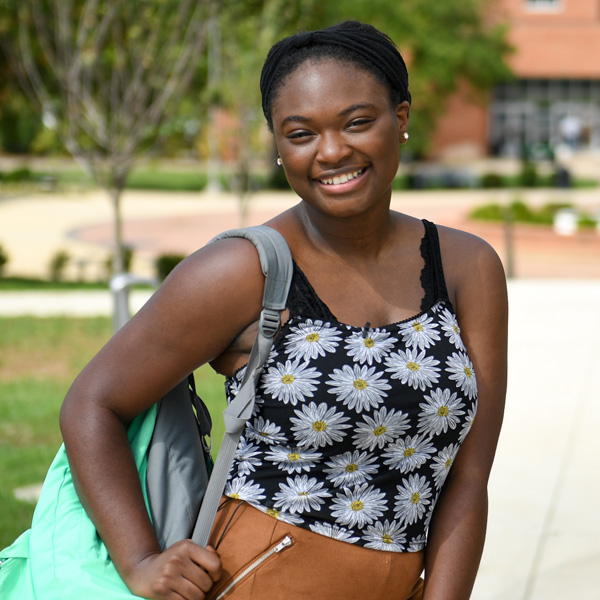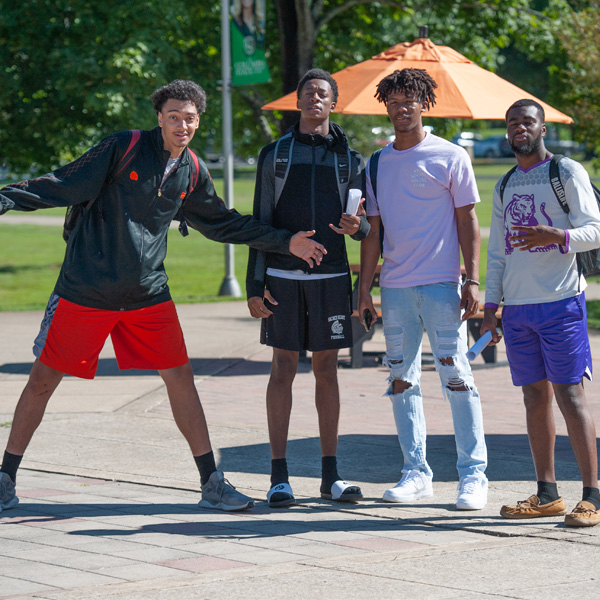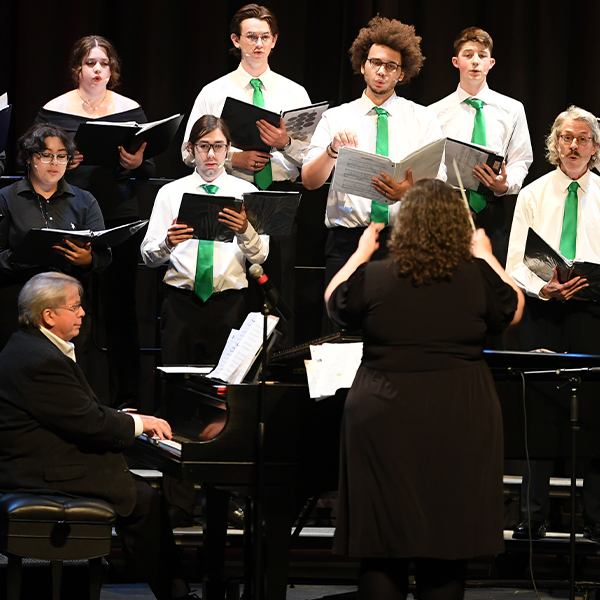
UNBOXED
The Social Sciences Club
A club for psychology and/or sociology major and all others who are interested in expanding awareness and "unboxing" closed minds. We will explore campus and community outreach with relevant issues such as mental health, diversity, deprivation of resources, inequality, violence and social injustice.
Cancel Culture Podcast
Cancel culture, the phenomenon of promoting the “canceling” of people, brands, and even shows and movies due to what some consider offensive or inappropriate remarks or ideologies, isn’t all that new. Societies have punished people for behaving outside perceived social norms for centuries, and this is just another variation. Cancel culture is an extension of or a contemporary evolution of a much bolder set of social processes that we can see in the form of banishment. They are designed to reinforce the set of norms. Join us for a contemporary discussion on cancel culture.
Guests: Sharon Grigsby, facilitator, psychology instructor; Lauren Pender, psychology honor student; Lexie Ayala, psychology honor student
Agenda:
- The effects of cancel culture
- The longevity of cancel culture
- Who bounces back (and why)
- The real-life effects of being canceled (are there any?)
To listen, go to Cancel Culture.
Mental Health Prevention in a Reactive Society
Although society is now stuck in a reactionary state of taking care of its mental health and well-being, it doesn’t need to be this way. In fact, it shouldn't’t. Rather than reacting to the mental health crisis, society should have already implemented proactive or preventive measures for greater mental health. After all, everyone has mental health all the time. And everyone is somewhere on the spectrum of mental health wellness. Yet our current mental health programs are treatment-based. They’re designed and built to support the 1 in 5 adults annually who experience some form of mental health illness. The mental health of these individuals shouldn't’t be the only one considered important during a pandemic — or at any other time.
Guests:
- Sharon Grigsby: Facilitator, Faculty, Social Sciences, Psychology
- Kimberly Young, MS, CLC, IMH-E, Case Manager, Adjunct Faculty Psychology
- Rachel Hanson, MS, CLC, IMH-E, Adjunct Faculty Psychology
To listen, go to Mental Health Prevention.
Intersectionality
There are larger concepts that we are all aware of in our lives. Our identities affect how we perceive these concepts, as well as how central they are to our experiences. The idea is to focus on one universal human experience or emotion and examine how different identities perceive and experience that feeling. What is the black, queer, female, trans, or native perspective on joy? On shame? On fear? On freedom? On anger? How does your identity shape how you feel about this? Does one of your identities have an effect opposite to another? How do your multiple identities interact to change your experience?
Our goal is to highlight the importance of different perspectives and identities while also highlighting their complexity. By hearing from diverse individuals, our hope is to avoid stereotypes and highlight personal nuance!
To listen, click Intersectionality.
Mental Health Awareness Month Podcast
Please join me and my guest, Melissa Febbrorielli, in a conversation about student mental health issues. Melissa and I will discuss general concerns we see on campus, as well as all of the therapies her department offers. We will close with what faculty, staff, and students can do to support one another. This podcast is sponsored by the social sciences club UNBOXED.
To listen, click Mental Health Awareness
Adverse and Positive Childhood Experiences and How it Affects our Young Adults
Join me and my experts, Kimmy Young and Rachel Hanson, to discuss adverse and positive childhood experiences. We will learn what they are, how they start, and what transpires into young adulthood. We will also speak to the education perspective in K-12 and higher education, and what we see in our classrooms. We will learn how we can help our communities and our schools to address these issues. Fascinating and very informative conversations!
To listen, click Adverse and Positive Childhood Experiences
The Psychology of Attraction
What historically has represented attractiveness and why? How have body types, dress, and societal norms changed to currently represent what is hot and what is not? What do different generations look for and want out of a relationship? How has social media played a role in our search for connection? The good, the bad, and the ugly of attraction.
To listen, click The Psychology of Attraction.
Social Media, Friend or Foe?
Social media has a rich history, just by the purest definition. We have been communicating and sharing information since the beginning of time. Times changed historically, and the word /news was spread by horse and rider or a single person announcing pertinent information in the town’s square. Jump to 2022, and we are consumed with media that perpetuates our lifestyles 24/7. There has been great innovation since the creation of the printing press, radio and television….and the Internet!! But……how has it changed us? Good, bad, or indifferent? This lecture recording explores this topic including a brief history and cultural reference and devotes the majority of time to the good, bad, and the ugly of social media.
Click to watch the Social Media recording.
Mental Health is an issue with all populations, but particularly with college students. As many as 80 plus percent of college students report anxiety and or depression. Sharon Grigsby will speak with Melissa Febbroriello and Kimberly Young. They are adjunct professors of psychology and social work and also counselors in the community. Grigsby will also speak with two of her sophomore psychology students of psychology, Anna Rich and Rada Peacock. They discussed mental health from a counselor's viewpoint, an instructor's viewpoint, and from the personal and academic viewpoints of students. They wrapped things up with the impact of the pandemic and how our campus can help.
This episode is sponsored by UNBOXED, the new social science club at Columbia State Community College. https://anchor.fm/sharon-grigsby7/episodes/Mental-Health-and-College-Students-e1fc4vq
The Menendez Brother's Trial
1989 vs 2023
On August 20, 1989, José and Mary “Kitty” Menendez were shot to death in their Beverly Hills home. Nearly seven years, three trials, and many thousands of hours of TV coverage later, their sons, Lyle, and Erik Menendez, were found guilty of their murders and sentenced to life in prison without the possibility of parole. In between, the Menendez murders became one of the most famous criminal cases of the late 20th century thanks to its potent mix of family drama, Hollywood connections, dramatic testimony, and cable TV’s ability to blanket the airwaves with coverage. After successfully trolling the Trump campaign and taking up Britney Spears’s cause, TikTok’s social justice-minded users are rallying around a surprising new crusade: to free the Menendezes, the Beverly Hills brothers who have spent the past 31 years in prison for murdering their parents. An army of teens has learned about a closed 1980s double homicide, and they think the convicted killers’ case deserves revisiting. No member of Gen Z was alive to watch the high-profile court trial of Lyle and Erik Menendez’s 1989 murder of their parents play out in real time. Still, many young social-media users have recently discovered the sensational case during the coronavirus pandemic.
View the recorded lecture.
Kids Who Kill
It is rare for a child under the age of 14 to kill someone; approximately 74 children a year do so in the United States. This is less than 1% of all homicide perpetrators. The vast majority (90%) are boys between the ages of 11 and 14 and, about 75% of the time, they kill someone older. Guns are most often the weapon of choice—60% of the time.
Research on recessions and their relation to social pathology, predicts that the homicide rate will rise among both youths and adults within the next 18 months. Regardless of any fluctuations in homicide, many will want to avoid this painful topic. We have an idealized version of childhood. We find child murderers so disturbing because we can't possibly believe that children are so desperate that they would kill.
View the recorded lecture.
Society Post COVID
Join us in a conversation concerning our society after the COVID-19 pandemic. We will discuss areas that may have been impacted, such as education, social interaction, aggression and violence, mental health, and other topics. 1. How pandemic isolation has affected college life. 2. Social media is becoming a primary mode of communication. Communication during COVID-19 and how it affected face-to-face communication now. 3. How social media has made politics more partisan 4. How this has affected activism (George Floyd and BLM during the pandemic). Why are crime rates going up now more than ever before? Was it because of COVID-19? 5. Isolation impacts the social skills of young people. Social issues are going on in today's society. How norms of self-expression softened when people had more time alone in isolation and away from the eyes of the public, both in terms of gender expression and more micro-trends appearing as subcultural gaps widened.
Guests:
- Sharon Grigsby: Faculty, Facilitator
- Julian Peacock: Student
- Shawn Pinote: Student
To listen, go to Society Post COVID.
The Psychology of a Hollywood Icon: Marilyn Monroe vs Norma Jean
Blonde, curvaceous, vivacious, and beautiful. Marilyn steps onto the silver screen with enormity. She charms her audience and captivates her suitors. She lives life large and with much controversy, but who was Marilyn Monroe, and was her titillating image a mere shell of the person hidden inside? Was the demise of her own making or the sad end to many of our media icons today?
View the recorded lecture
Playboy, Penthouse, and Pageants: The Objectification of Women in Modern History
Objectification of women is a pervasive issue that has existed throughout history but has become increasingly prominent in modern times. It is the act of treating a person as an object, rather than a human being and valuing them solely for their physical appearance. This can happen in a variety of ways, including through media, advertising, and everyday interactions.
View the recorded lecture
Dahmer: The Psychology of a Cannibal
Jeffrey Dahmer, also known as the Milwaukee Cannibal or the Milwaukee Monster, was an American serial killer and sex offender who committed heinous crimes in the late 20th century. Understanding the psychology of individuals like Dahmer is complex and involves considering various factors, though it's important to note that each case is unique, and not all individuals with similar experiences or traits become criminals. Join me for a conversation about the history and psychology of cannibalism, and the criminal psychology of one of the most notorious serial killers in modern history.
Join the lecture
Dark Psychology: Cults, Serial Killers, Manipulation and Dependence
Join me and my psychology honors students in a riveting discussion on things concerning dark psychology. We will define the term cult, and what parameters one takes to be lured into cult behavior: what defining behavior, per the leader and its participants, is necessary to be successful. We will also discuss the world of serial murder. Are killers born that way, or do environmental factors persist? What are their characteristics and how do they choose their victims? Just a sampling of topics to be discussed. Join the dark side!
Participants:
- Assistant Professor Sharon Grigsby, Facilitator
- Emily Branch, student
- Barrett Bush, student
- Kaitlyn Chumbley, student
- Julianna Duarte, student
- Julia Edde, student
- Keoni Paar-Thong, student
- Meagan Staggs, student
- Braxton Shirley, student
- Joey West, student
Substance Use Disorder Awareness Podcast
Join us for an informative podcast surrounding the stigmas, clinical practice, and long-term recovery for substance abuse disorder. (Substance Use Disorder Awareness Podcast)
Stop the Silence: End the Violence
Join us for a powerful conversation on gender-based violence and the fight for change. We will discuss expert insights on the impact of violence and solutions for prevention and support. (Stop the Silence: End the Violence)
Jack the Ripper: The Terror Returns
Step into the fog-drenched alleys of Victorian London, where fear lurks in every shadow. The year is 1888, and a killer walks among the gaslit streets—silent, brutal, and never caught. Who was Jack the Ripper? A madman? A mastermind? A myth? A woman?
Uncover the chilling truth behind history’s most infamous serial killer. Clues, suspects, secrets—dare you follow the trail?
Join me, Doc Grigsby, and Professor Colleen McCready, esteemed author of serial killings, in a conversation about Jack.
Join us for an in-depth conversation about the real value of a college degree in today’s economy. In this episode, we examine what higher education truly offers, the escalating burden of student loan debt, and whether the return on investment still makes sense. We dig into student experiences that reveal both the promise and the pressure of pursuing a degree, questioning whether college remains the most reliable path to financial stability. Hear candid stories, honest reflections, and the hard truths everyone considering higher education needs to know. If you’re planning for college or planning to pay for it, this is an episode you won’t want to miss.
Guests:
Daze Boyle
Brianna Gill
Anna Groenewoud
Bianca Kennedy
Valerie Martinez-Contreras
Abbi McAlister
Jian Self
Seth Stole
Emily White
Lincoln Williams
To listen, go to College: Opportunity at What Cost?







